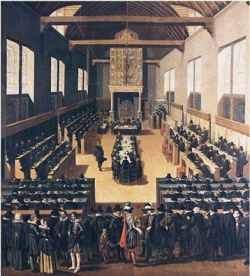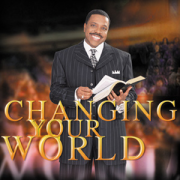The Canons of Dort, First Head of Doctrine, Article 7
 Thursday, January 17, 2008 at 02:09PM
Thursday, January 17, 2008 at 02:09PM  Article 7: Election
Article 7: Election
Election is God's unchangeable purpose by which he did the following: Before the foundation of the world, by sheer grace, according to the free good pleasure of his will, he chose in Christ to salvation a definite number of particular people out of the entire human race, which had fallen by its own fault from its original innocence into sin and ruin. Those chosen were neither better nor more deserving than the others, but lay with them in the common misery. He did this in Christ, whom he also appointed from eternity to be the mediator, the head of all those chosen, and the foundation of their salvation. And so he decided to give the chosen ones to Christ to be saved, and to call and draw them effectively into Christ's fellowship through his Word and Spirit. In other words, he decided to grant them true faith in Christ, to justify them, to sanctify them, and finally, after powerfully preserving them in the fellowship of his Son, to glorify them. God did all this in order to demonstrate his mercy, to the praise of the riches of his glorious grace. As Scripture says, God chose us in Christ, before the foundation of the world, so that we should be holy and blameless before him with love; he predestined us whom he adopted as his children through Jesus Christ, in himself, according to the good pleasure of his will, to the praise of his glorious grace, by which he freely made us pleasing to himself in his beloved (Eph. 1:4-6). And elsewhere, Those whom he predestined, he also called; and those whom he called, he also justified; and those whom he justified, he also glorified (Rom. 8:30).
________________________________________
In article seven, the Canons set forth a working definition of election which will be used throughout the following articles. It is always important to define our terms and this is what the authors do here. We can best understand this definition by working our way through the main points in order.
First, the Canons point out that election took place in eternity past—“Before the foundation of the world.” This is what Paul states in Ephesians 1:4-6, and his point should be carefully considered so that we remove from our thinking all notions of election being based upon something God sees the creature doing–as in the case of those who argue that God merely knows in advance what we will do under certain conditions and reacts accordingly. While election takes place in eternity past, God executes his eternal decree in time and space. Redemptive history is therefore the outworking of God’s eternal decree. This too can be seen in Ephesians 1:7-10, when Paul speaks of the work of Christ for us, and then in verses 11-14, when he speaks of Christ’s work being applied to believers by the Holy Spirit.
Second, we are told that our election is based upon “sheer grace, according to the free good pleasure of his will.” In other words, the reason why God elects anyone to be saved, is because he is good and merciful, not because we are lovable or desirable. Neither can we say God “needs” us, as if he were lonely. Let us not forget that God is triune and has known a perfect inter-Trinitarian love from all eternity. As much as we wish it were so, God could get along fine without us. The reason why any of us are chosen in Christ remains a mystery which lies hidden in the eternal counsel of God.
Third, God “chose in Christ to salvation a definite number of particular people out of the entire human race, which had fallen by its own fault from its original innocence into sin and ruin.” In order to understand the doctrine of election, it is imperative that we see it as a divine rescue of sinners. In election, God rescues a multitude so vast they cannot be counted (Revelation 7:9) from the guilt and the consequences of their sin (Romans 5:12, 18-19). Because we are all sinful, we will not come to God, unless we are first chosen by God, then called through the preaching of the gospel, and given the gift of faith. God has chosen to save those whom he has chosen, and his saving grace is specifically directed toward the men and women he intended to save from his own wrath. He does not direct his saving grace toward the human race generally (or ineffectually). This means that God acts directly upon those whom he intends to save, so that they come to faith in Christ and receive the forgiveness of sins and a justifying righteousness. The Bible does not teach that God makes it possible for sinful men and women to save themselves with his help.
The fourth point is closely related: “Those chosen were neither better nor more deserving than the others, but lay with them in the common misery.” Those chosen can count on the fact that God chose them to confound the wise! There is nothing to boast about if you are a believer in Christ. In a remarkable passage in Deuteronomy, we read of God’s election of Israel: “For you are a people holy to the Lord your God. The Lord your God has chosen you to be a people for his treasured possession, out of all the peoples who are on the face of the earth. It was not because you were more in number than any other people that the Lord set his love on you and chose you, for you were the fewest of all peoples, but it is because the Lord loves you and is keeping the oath that he swore to your fathers, that the Lord has brought you out with a mighty hand and redeemed you from the house of slavery, from the hand of Pharaoh king of Egypt” (Deuteronomy 7:6-8). God chose Israel for reasons known to himself, and not because of any good works or great faith he foresaw in his chosen nation.
Likewise, for the Christian, election is God’s gracious choice to save a particular sinner who deserves his just wrath and punishment so that in the end God will be glorified and the sinner redeemed. God is not taking anything away from other sinners, nor is he preventing other sinners from coming to faith. All are equally guilty before God and deserving of his judgment. But in his unspeakable grace, God chooses to save some who would otherwise perish eternally.
Fifth, we must take note of the fact that “He did this in Christ, whom he also appointed from eternity to be the mediator, the head of all those chosen, and the foundation of their salvation.” Christ is elect one, in whom all of God’s elect are chosen and justified. This means we are chosen in Christ, called to faith by the preaching of Christ crucified, justified by the blood and righteousness of Christ, and sanctified by the Spirit of Christ, before we are glorified. Christ is the mediator of the covenant of grace, which is the historical outworking of God’s gracious decree to save. This is why our election is inextricably tied to our faith in Christ. God elects us in Christ so that we will believe in Christ.
So, how then do you know if you are numbered among the election? The answer is to be found in Christ! As Calvin points out, Christ is the mirror of our election (Institutes, III.xxv.4). In other words, if you believe in Jesus, you are assured that you are among the elect, because election is always “in Christ.”
Sixth, the Canons point out that “[God] decided to give the chosen ones to Christ to be saved, and to call and draw them effectively into Christ's fellowship through his Word and Spirit. In other words, he decided to grant them true faith in Christ, to justify them, to sanctify them, and finally, after powerfully preserving them in the fellowship of his Son, to glorify them.” This is important because it means that God not only elects us in Christ, giving us to Christ (as Jesus declares in John’s gospel, “All that the Father gives me will come to me, and whoever comes to me I will never cast out” (John 6:37), but that God also acts in Christ to ensure that his elect are called through the preaching of the gospel, that they believe when the gospel is preached to them, and that all the benefits of Christ are now theirs, applied to them by the Holy Spirit.
Paul sets this forth in unmistakable clarity in Romans 8:28-30: “And we know that for those who love God all things work together for good, for those who are called according to his purpose. For those whom he foreknew he also predestined to be conformed to the image of his Son, in order that he might be the firstborn among many brothers. And those whom he predestined he also called, and those whom he called he also justified, and those whom he justified he also glorified.” This passage is often called the “golden chain" of our salvation.
Finally, the ultimate reason behind this doctrine is clearly and simply stated— “God did all this in order to demonstrate his mercy, to the praise of the riches of his glorious grace.” As we said earlier, there is no reason to be given for grace, but grace. All praise, glory, and honor must go to God when a sinner is saved by God from God. There is no human boasting allowed!









